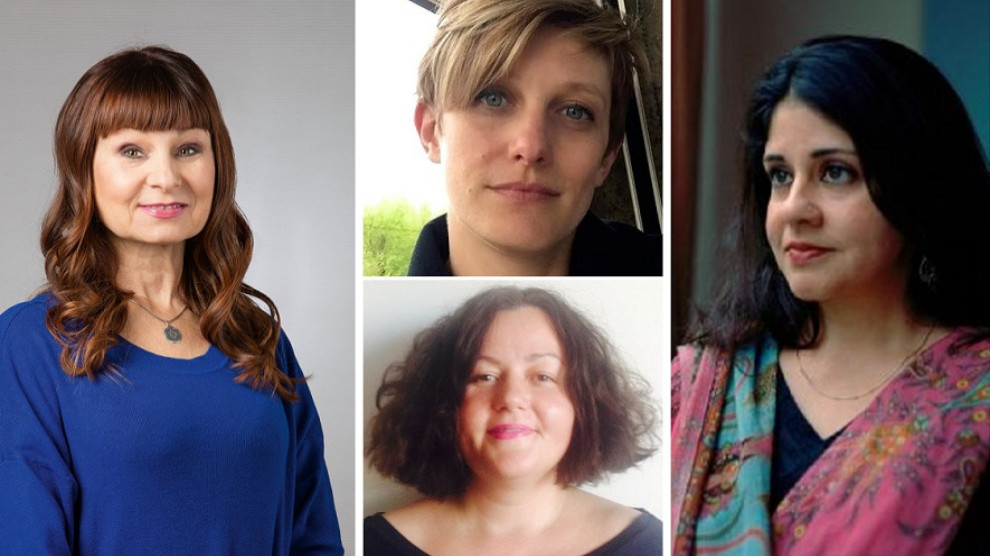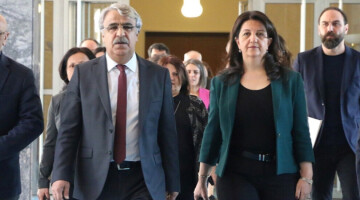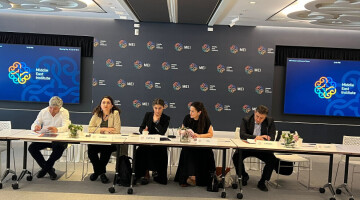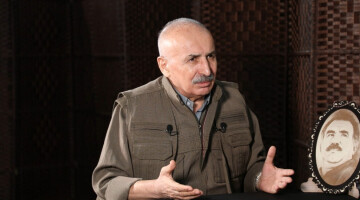Various women from Slovenia, Pakistan, Hungary, Croatia, England, USA and Poland show solidarity with the revolution in Rojava and condemn the illegal war of aggression and occupation of Turkey on Northeast Syria since 9 October. They draw parallel between the attack on Rojava and attack on the achievements of the liberation struggle of women worldwide. The revolution in Rojava was marked by the liberation of women and inspires many women in the world. In this context, the following women have spoken for the ANF.
Violeta Tomić, Member of the National Assembly Slovenia – LEVICA (Slovene: Levica = The Left, its political party), Ljubljana, Slovenia
In my hands, I hold the book: »Revolution in Rojava, Democratic autonomy and Women’s liberation in Syrian Kurdistan«, written by Anja Flach, Ercan Ayboga and Michael Knapp.
I am most fascinated about the social experiment of direct democracy, which developed in multi-ethnic and multi-religious areas of Northern Syria during the Civil War, representing a peaceful democratic alternative for Syria and the Middle East, an alternative for Syria and the whole world.
It represents the possibility of overcoming conflicts, religious, national, and political, which maintain permanent war, and the destructive interventions of regional and foreign military.
In Rojava, you create a model of calm coexistence and self-determination for all communities of the Syrian mosaic. It is priceless that at the core of this project you recognize the liberation of women and deconstruction of patriarchal social patterns and institutions.
With great honor and pride, I accepted the invitation to join demonstrations in Budapest last October in support of revolution in Rojava and to protest against Erdogan’s visit to Orban and Hungary.
I was there because I strongly believe that it is of utmost importance to show solidarity with these rare positive projects, which are giving hope to our world.
Unfortunately, our media don’t report about Rojava, don’t give any information about your battle. They only talk about issues connected to global capitalist interests, which are dominating the world, sowing wars and harvesting death. People of Europe don’t know what is happening in Kurdistan or they are misled or wrongly informed.
But if we don’t recognize our common enemy, if we don’t become aware and learn things, we will be an easy target of manipulation again and again, and forever. That’s why we have to stand together, support each other in solidarity when the destiny of our planet and destiny of humanity is at stake. We must fearlessly reject all reactionary nationalist ideology, violence, war and suffering of innocent people. We must give hope and open the way for social and political transformation for future generations.
We must know, that we all are parts of this fragile texture, and therefore it is: ONE WORLD, ONE FIGHT!!!
Cinzia Arruzza, Italian philosopher and writer, Associate Professor of Philosophy
New School for Social Research and Eugene Lang College, New York, USA
The Turkish assault on the people of Rojava, effectively authorized by the U.S., is an assault on one of the most vital ongoing projects in feminist and democratic life today. The women and men of Rojava have shown the world that principled resistance to the most brutal forces of reaction can, and must, be undertaken in concert with ambitious collective efforts to organize our social relations justly. Rojava has offered a significant example, not just for the Middle East, but also for the rest of the world of how it is possible to democratically reorganize our social bonds in the course of struggle. For this, the Kurds have long been cynically targeted by the Turkish State’s mobilization of the discourse of ‘terrorism.’ Today, I believe that it is vital to extend our solidarity to Rojava and to condemn the attempts of Erdogan, Trump, and Daesh to extinguish the revolutionary torch that the people of Rojava have lit for all the world to see.
Dr. Nida Kirmani, Feminist sociologist working on gender and urban marginality in South Asia, Associate Professor of sociology at the Lahore University of Management Sciences (LUMS), Pakistan
I am deeply distressed at the reports of human rights abuses and a growing state-inflicted humanitarian crisis developing in the Rojava region. Rojava has been a symbol of hope for all progressive people around the world including myself. As a feminist, I have been particularly inspired by the leadership of Kurdish women, who have been at the forefront of the struggle for democracy. I stand with the people of Rojava and with the People’s Democratic Party in their struggle for peace and justice in the region, and I call on the international community to stand in solidarity with them and to condemn the Turkish state and all its allies including the Trump regime. As a Pakistan-based scholar, I also call on the government of Pakistan to condemn the actions of the Turkish government and to stop supporting Erdogan’s repressive policies.
Zsófia Ádám, activist, Budapest, Hungary
“We are the mountains of Kurds.” From another aspect, the Kurds and all the people of Rojava are the mountains of us.
Rojava is our future. When we express our solidarity in Hungary, we not only reject the genocide against the communities of Rojava, but we also stand for the same vision of an ecologically sustainable and socially just system. The very base of solidarity is when we realise that our struggles are common since oppression by the nation state, capitalism and patriarchy is global. Everywhere, but especially here in Hungary, like in other states in peripheral or semi-peripheral positions, the people of Rojava show us a way to say no to oppression and an alternative holistic answer to problems we all face like environmental destruction, sexism, and unequal participation in decision making. We have to help to defend Rojava and we should learn from them to make our countries free by let our women be free.
I’m a member of a women council built up in the Hungarian Rojava solidarity movement following the example of them. We stand with the oppressed, especially with all of our sisters who are fighting in YPJ, risking their lives as a politician, doing medical or social work in the occupied fields, or being forced to refuge as civil habitant. We express our angry dissociation against all the imperialist great powers which attack the democratic and free community of the autonomous Kurdish people; with special regard to the Turkish and Hungarian government (who hosted Erdogan last month in Budapest) and also the American and Russian governments whose (non) actions cost human lives.
We wish strength for the living and peace for the dead!
Long live the feminist ecosocialist North Syrian Democratic Federation!
Long live the revolution of women!
Rahila Gupta, writer, journalist and activist, London, UK
Ever since I visited Rojava in 2016 and discovered, to my amazement, that a women’s revolution was flowering in the most unpropitious of circumstances, behind the frontline of a vicious battle with Daesh, I have made it my business to do whatever I can to support it. Unlike the political actions that I had been involved in to-date, to improve the legal, policy, and cultural response to the violence faced by women, particularly black women in the UK, the political struggle of the Kurdish people played out at such a high level of international geo-politics that it was hard to know how and where to intervene. Spreading the word about this ethnically inclusive and ecologically sustainable, ground-up democratic experiment to counter the silence and widespread ignorance, no doubt the result of a concerted media conspiracy, became part of my strategy of support. I would end many of my speeches with the plea that ‘Another world is not only possible, it is here but it is struggling to take breath. It is our political responsibility to ensure that the Rojava experiment does not end’. But the words felt a little hollow when, despite the attempts of the Kurdish people, their organizations, their supporters, some of them very highly placed in the political elite, we couldn’t even get them a seat at the Geneva Peace convention to discuss the future shape of Syria. The almost universal condemnation of Erdogan, President of Turkey, for having invaded and occupied parts of Rojava at the NATO meeting in London in December and the fact that the fate of Syrian Kurds was so high on their agenda is a success of sorts. I fervently hope that this represents some sort of guarantee of their future existence.
Anita Lunic, young philosopher, University of Split, Croatia
Rojava or Autonomous Administration of North-East Syria, as a multiethnic and multireligious region with bottom-up democratic structures, self-government, and confederalism, should serve as a role model for the future organization in the region, and not as a playground for war crimes. Insisting on peaceful coexistence, cultural and social rights, ecologism and environmental stability, woman liberation and gender equality, especially in the situation of war and terror, deserves all of our sympathies and support. We should strive to be the mountains that protect them – because of the values they represent.
If we do not raise our voices against the invasion in northeastern Syria, we will end up (once again) on the slippery ground of arbitrary value of both human lives and human rights. I hope we won't allow that. We should strive to be the mountains that protect them – because it is about all of us.
We owe respect to Kurdish people (as well as those standing with them) due to their efforts, sacrifices, and merits in defeating Daesh and rebuilding the region. We should strive to be the mountains that protect them – because of the hope they bring.
I hope our voices against human rights violations (recorded extensively by international bodies), actions that incite and perpetuate violence, war crimes, cultural and ethnic discrimination, forced displacement as well as the usage of human lives as a currency in power games, will be heard. And that Autonomous Administration of North-East Syria will be recognized as a partner in peaceful dialogue about the future of the region.
Dr. Johanna Riha, epidemiologist and recently finished her PhD at the University of Cambridge, UK
The recent illegal and inhumane Turkish invasion in northern Syria has had catastrophic effects on so many living peacefully in the region and has led to further displacement of hundreds of thousands of people as well as numerous human rights atrocities. The inspiring project of direct democracy and women's liberation that has been in construction in Rojava offers a radical alternative to the worldwide dynamics of tyranny and permanent war. The assault on this Kurdish project of self determination is in actual fact an assault on all our futures. Long live the Rojava revolution. Women. Life. Freedom.
Dr. Ewa Majewska, feminist philosopher and activist, Warsaw, Poland
As I heard about the sudden military engagement of Turkish armed forces in Syria, I was devastated. There is no statement, which can express my disagreement with such actions, which will most probably lead to another genocide, my fear about Rojava and other dissenting groups and communities, which were - sometimes for years - fighting fundamentalist armies. I am appalled by the ease, with which first the US, and then also many of the European countries, tacitly accepted this invasion. This war has to end, as should the persecution of Kurds.
Janet Biehl, author, copy editor, and graphic artist, Burlington, USA
The catastrophe now being inflicted on the Kurds, Arabs, and Christians of North-East Syria is a massive historical injustice. They did nothing to deserve it. On the contrary, the SDF was the best ally the US-led coalition could have dreamed of in the war against Daesh; the fighters were not only effective but acted with honor, courage, and nobility. They deserve the gratitude, respect, and honor of the rest of the world--not genocidal betrayal of them and the society they so faithfully defended...
Since 2012 the North-East had built a remarkable society, based on a new mentality of democracy in contrast to dictatorship. In only a few short years, democratic councils and communes enabled all members of society to participate in self-administration. A revolution freed women from patriarchal coercion and unleashed their power, creativity, and brilliance. And an insistence on ethnic and religious inclusiveness replaced tribal resentments with peaceful coexistence. The war against Daesh welded all the components together in a life-or-death struggle, as everyone understood that they would stand or fall together. Today in the region’s many martyr cemeteries, Kurds, Arabs, and Christians, men and women, lie at rest as they fought: side by side, brothers and sisters in arms. The people of the North East made their social advances quickly, almost as if they were racing against the clock, squeezing as much social progress as they could into every minute of autonomy. For seven years they experienced self-determination, and no Turkish-backed arms can destroy that experience, or reinstate a slave mentality, or tribal resentment, or patriarchy. More than ever in the past, citizens around the world recognize the achievements of the Syrian Kurds and solidarize with their ongoing resistance. Today, as people struggle against repressive rule in their own countries, they understand what the Kurdish movement long taught: that resistance is life. This international solidarity gives all our struggles hope.
RELATED NEWS:














